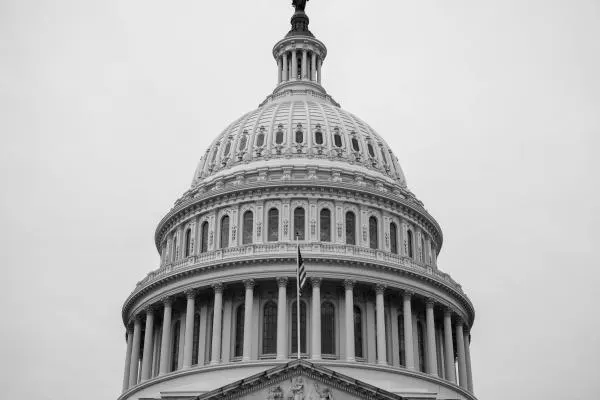
No one could predict what President Donald Trump would do in the last days of December 2020, and stunned onlookers could only wait and hope. One lobbyist recalled how he didn’t dare to bring up the elephant in the room as Trump debated signing the $900 billion COVID recovery stimulus bill into law. “We didn’t want to give him any excuse not to sign it,” the lobbyist said. They hoped Trump wouldn’t notice a provision hidden deep within the hundreds of pages of legislative text — one that would soon send a select group of stocks soaring to cap a banner year.
‘A huge win for the planet’
The elephant in the room was, of course, the term “climate change.” Clean energy activists and lobbyists — including Stephen Yurek, a lobbyist for the coolant industry — were afraid to point out that the bill contained a historic stimulus that would advance clean energy in the United States. They worried that Trump — who had publicly scorned clean energy — would reflexively veto any bill he saw as advancing “the Green New Deal” or any other part of Biden’s agenda. Even so, for a while, the bill’s passage seemed to be in grave doubt. Trump publicly called it “a disgrace.” He said the unemployment benefits were too meager. But he never condemned — or likely even noticed — the massive goodies for clean energy tucked away inside the mammoth bill. And Dec. 28, 2020, the strategic silence from lobbyists, activists, and lawmakers finally paid off… Trump signed the law sending $35 billion in tax credits and subsidies toward clean energy. But the bill did much more than that. It committed to phasing out hydrofluorocarbons, a greenhouse gas many times more powerful than carbon dioxide. Shockingly, this standard meant Trump was allowing the United States to fulfill a Barack Obama-era treaty on phasing out hydrofluorocarbons — the very treaty he had renounced upon taking office.
Clean Energy Cheerleaders Finally Celebrate
Rolling Stone called the law “a huge win for the planet.” Michael Brune, executive director of the environmentalist group Sierra Club, called it “a light in the darkness.” Another environmental advocate called it “perhaps the most significant climate legislation Congress has ever passed.” And clean energy stocks celebrated accordingly. Electric vehicle stocks like Tesla Inc. (NASDAQ: TSLA) and Nikola Corp. (NASDAQ: NKLA) jumped 33% and 56%, respectively, over the following month. The fuel-cell firm Plug Power Inc. (NASDAQ: PLUG) rose 117%. The First Trust NASDAQ Clean Edge Green Energy Exchange-Traded Fund, which contains a basket of clean energy stocks across various sectors, rose 23.96% for the month. But clean energy stocks are facing an even bigger catalyst today. In August, President Joe Biden signed the Inflation Reduction Act into law — and with it, $369 billion in spending to advance clean energy in America.
If the $35 billion Trump showered on renewables in 2020 could help some clean energy stocks double in a month’s time, what will $369 billion do for the sector as officials begin to implement it?
One of the biggest opportunities in clean energy today is in electric vehicle (EV) stocks. Biden’s infrastructure law is already spending $7.5 billion to create America’s first-ever national network of electric vehicle charging stations. This network will make it easier to take long trips, either through rural or urban America, without needing to worry about running out of charge before finding an EV charging station — making so-called “range anxiety” a thing of the past.
The law also awards a $7,500 tax credit to Americans who buy EVs, with only a few conditions. One of them is that car companies can only extend this credit to the first 200,000 sales — meaning that big names like Tesla and General Motors Co. (NYSE: GM) are now ineligible.
But for the electric vehicle startups Benzinga is following, it’s a different story. Eli Electric Vehicles is preparing to ramp up production of its micro-electric vehicles — smaller, efficiency-minded EVs designed to help people travel in urban, crowded environments with minimum hassle.
As the Biden administration shoots for its target of EVs representing 50% of all car sales by 2030, companies like Eli Electric are ones to watch as a $369 billion tailwind powers renewable energy stocks.
Don’t miss real-time alerts on your stocks – join Benzinga Pro for free! Try the tool that will help you invest smarter, faster, and better.